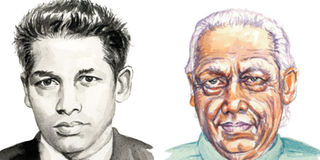Firebrand felled by assassin’s bullet

LLUSTRATION | J NYAGAH Pio Gama Pinto (left) at 38 when his life was cut short by an assassin’s bullet in 1965, and, right, how we think he could have looked like today, aged 86.
What you need to know:
- Pinto was the first politician to be murdered in independent Kenya
Pio Gama Pinto was a journalist, trade unionist and freedom fighter who was assassinated in 1965 aged 38.
He was the first politician to be murdered in independent Kenya, probably because of his socialist leaning.
Born of Goan parents on March 31, 1927, Pinto was the founder of the Kenya African National Union (Kanu) newspaper — Sauti Ya KANU — in 1960. The newspaper later became Pan African Press.
He was the brainchild behind the Lumumba Institute that was established in 1964 to train Kanu officials, but which was later perceived by the Western-leaning politicians as a training ground for communism in Kenya.
Pinto was crucial campaigner for Kanu in the 1961 elections, which the party won.
Due to his prominent role in the fight for independence, Pinto was elected a Member of the Central Legislative Assembly in 1963.
Later in 1964, he was appointed a Specially Elected Member of the House of Representatives.
However, Pinto was shot dead in his car on February 25, 1965 in front of his gate in Parklands, Nairobi, as his young daughter watched.
One Kisilu Mutua was arrested, charged and jailed for the killing, but on his release on a presidential pardon after 35 years, he maintained his innocence.
Pinto’s father was an official in the colonial government of Kenya. He sent Pinto to study in India at age eight.
Pinto later attended St Joseph’s High School, Arpora, then Karnatak College, Dharwar, where he studied science.
In 1944, he joined the Indian Air Force as an apprentice ground engineer.
At the age of of 17 while in Bombay, he joined agitation against the Portuguese colonial occupation of Goa, and had to flee back to Kenya in 1949 to avoid arrest.
After doing a few clerical jobs and stints as a journalist with the Colonial Times and the Daily Chronicle, he turned his attention to politics as part of the group that sought to stop the British colonial rule.
Due to his political activities, he was arrested in 1954 and spent four years in detention until October 1959.




